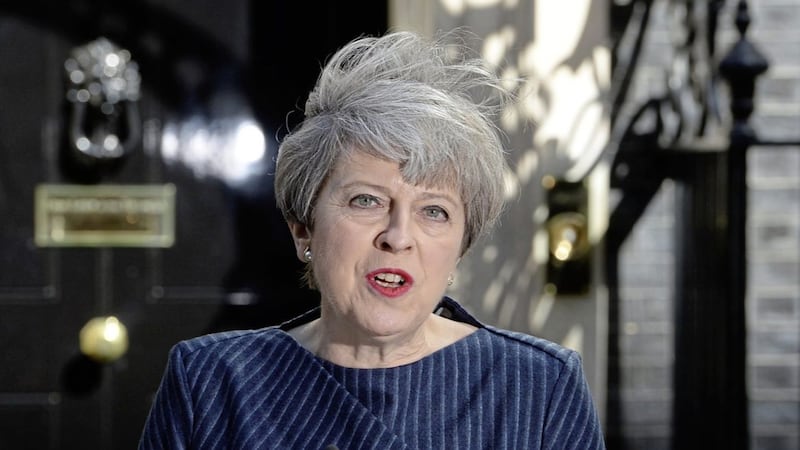THE so-called `snap' election should have come as no surprise.
Writing in the Irish News on July 1, 2016, I wrote: "What happened on June 23 was that a government lost (some people have forgotten that the referendum was government policy) and a campaign won. That campaign must now be transformed into a government.
Personally, I don't see how that transformation happens without a general election sometime in the autumn, because the exit from the EU requires a government with a clear mandate and manifesto. Just appointing a new prime minister, who then shuffles the existing MPs, won't be enough."
OK, the election is about eight months later than I predicted, but it was always unavoidable.
No prime minister could embark upon such a momentous political journey in the absence of her own personal mandate and, as she clearly hopes, a thumping endorsement from the electorate.
If she gets her mandate (and it can't, of course, be taken for granted) then she weakens the clout of those who remain opposed to Brexit, while strengthening her own hand in the House of Commons.
It also gives her the opportunity to set out what she really meant by, "Brexit means Brexit", while allowing her opponents to set out their alternatives: so big challenges for both the Leave and Remain camps.
A strong personal/political mandate also strengthens her hand with the EU's negotiating team, some of whom have questioned her authority to speak for the United Kingdom.
And, since all politics is underpinned by Machiavellian logic, hitting your opponents - particularly Labour and Ukip - when they are weak makes perfect sense.
The impact on local politics will be interesting.
I think Sinn Féin will welcome both the timing and the background: they reckon themselves to be on an electoral roll and probably hope that a `hard Brexit' approach from Theresa May will play into their hands.
Within minutes of her announcement, Gerry Adams tweeted: "So Ms May has called a British General Election. Sinn Féin is up 4 that! Another chance to vote against Brexit and 4 progress."
They will be targeting Mark Durkan's Foyle seat (where they had a good result in March) and hoping to regain Fermanagh/South Tyrone, where they were within 1 per cent of the combined UUP/DUP/TUV/Conservative in March.
Nothing is set in stone yet, but I'm pretty sure that the DUP/UUP will opt for an electoral pact.
The UUP seat in Fermanagh/South Tyrone is unwinnable without one; East Belfast could be uncomfortably close for the DUP's Gavin Robinson; North Belfast is also increasingly tight for Nigel Dodds; while both South Belfast and North Down would be reasonable bets for either the UUP or DUP on the back of a pact.
Meanwhile, the UUP's Danny Kinahan could have a problem in South Antrim (where the DUP outpolled the UUP by 33.8 per cent to 20.7).
So, a pact could be very useful for both parties.
It would, of course, be a huge challenge for Robin Swann - barely into the job as UUP leader - but he won't want his first election to be remembered for the loss of the party's two seats.
Yet, if he does cut a deal with Arlene Foster for Westminster, there will be a temptation to set the template for an electoral pact for the next assembly election, too.
I don't think both elections will be on the same day, primarily because it involves separate voting systems (which could cause problems), but also because the campaigns would be about very different issues.
Any decision on that second election would normally be reached after the collapse of the present talks, with no deal having been reached.
But the Secretary of State may conclude that the talks should be postponed until after June 8 (which, just about, falls within the `reasonable period' framework), arguing that the general election was an unexpected circumstance.
Or, the DUP and/or SF may decide that conducting talks in the middle of an election is probably pointless, anyway, because no-one will want to risk any hostages-to-fortune.
It could also be a tough enough election for the SDLP, particularly if Sinn Féin's electoral tail remains up during the campaign.
The assembly election was better than expected for them; but this will be a tougher battle, especially if the DUP/UUP cut a deal which embraces South Belfast. Alliance will want to build on their assembly performance, their third best vote tally, while holding on to the small-u unionist votes they picked up across Belfast.
My instinct is that this will be a particularly polarising election, even by our usual standards.
Brexit, border polls, Irish unity, a buoyant Sinn Féin, a rattled Arlene Foster, a spooked unionism and a much-strengthened Theresa May (who wouldn't be so dependent on the DUP in Westminster) serves the interests of orange and green very nicely.







